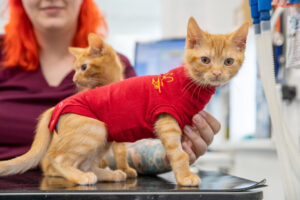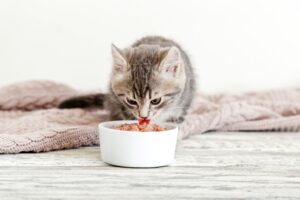Kittens are a lot of fun! While they’re energetic and inquisitive, they do bring with them a responsibility to you, their caregiver, to ensure they grow into a confident and healthy adult cat.
To take the best care of your kitten, you will need to provide:
- Positive, consistent and predictable social interaction.
- A safe space for your kitten to retreat to when they are feeling overwhelmed.
- Multiple and separated key environmental resources (food, water, toilet areas, scratching areas, play areas and rest/sleeping areas).
- Opportunity for appropriate play.
- An environment which respects their sense of smell.
These pointers are known as the “five pillars of a healthy feline environment”, and are the key to supporting your kitten’s emotional wellbeing.
For further information, please read the AAFP and ISFM feline environmental needs guidelines.
Alongside these, it is also important to consider the physical health of your kitten. As a caregiver, you’ll need to fulfil the following welfare needs:
- A diet which provides the correct nutrition for a growing kitten.
- A suitable environment for your kitten to grow in.
- The ability for your kitten to exhibit their natural behaviour.
- To be housed with or apart from other animals.
- Protection from pain, suffering, injury and disease.
These five welfare needs can sometimes be overlooked by caregivers, but are important throughout the kitten’s journey into adulthood.

All cats are obligate carnivores, meaning they must consume a diet containing meat products, something which may not appeal to a vegetarian or vegan owner.
As well as this, cats are self-sufficient, solitary yet selectively sociable predators. This means that cats prefer to be on their own but may choose to be sociable towards other cats which they bond with or share resources with (food, sleeping areas etc).
However, this could mean conflict in households with multiple cats of different ages and genders if they do not get along. As a cat caregiver, you must be able to recognise if your kitten is stressed around other cats and if it is fair to an existing older cat in your home to be met with a rambunctious kitten!
Cats are predators and have evolved to hunt and chase prey, which means that as a caregiver you must provide a stimulating environment if you choose to keep your kitten as an indoor cat – a bored kitten can become destructive and bored adult cats are prone to obesity or could begin to exhibit behaviours which are unappealing such as inappropriate urination in the home.

Lastly, the typical cost of owning a cat is estimated to be around £1500 a year, if you take into consideration food, litter, veterinary care, cat-sitting costs when you go on holiday, insurance and all of the equipment that a kitten will need.
Remember that as your kitten grows, so too does their food intake and the size of their cat carrier and litter trays they need, as well as new toys and beds.
It is also important to be able to prevent illness and injury through neutering, regular vaccinations, health checks and preventative treatments such as flea and worming.
It’s always sensible to have a plan in place should your cat require unanticipated treatment, and pet insurance can offer a potential solution for peace of mind against unexpected costs.
We made it a bit more moderate as we wanted to reflect that our vet teams are here to help whether you have insurance or not, it would be good to reflect this here too.
Kittens make for amazing companions and are a joy to interact and share your home with, but they are a big commitment of 12 to 18 years or more.
Remember, your veterinary practice will be happy to help you and answer any questions you have about caring for your kitten!
Written by:
Claire Kealey RVN – Veterinary Nurse
